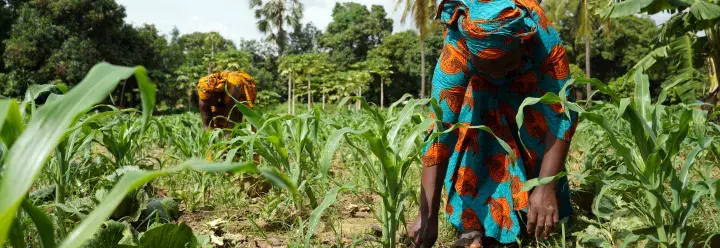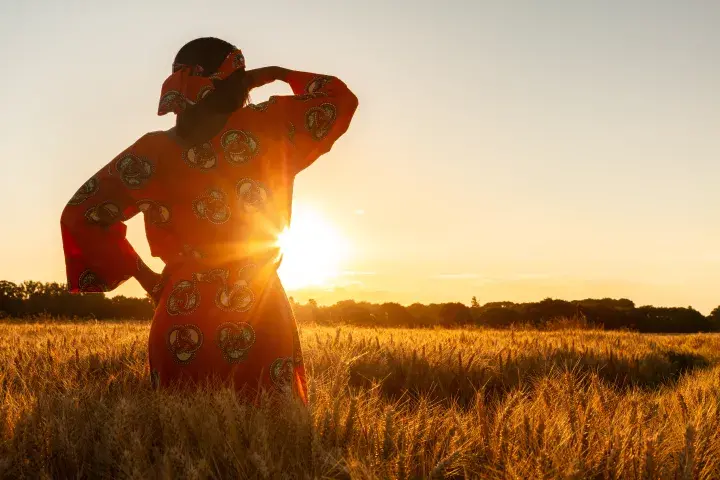Gender equality isn’t just important in its own right. It’s also key to unlocking other impacts that sustainability standards and similar systems are striving towards, from fighting poverty and improving working conditions to strengthening communities and environmental stewardship.
So it’s hardly surprising that we’re seeing growing interest from sustainability systems in how they can tackle gender inequalities and empower women through their schemes – from requirements within their standards to launching gender strategies and programmes.
In 2022, ISEAL worked with the CGIAR Initiative on Gender Equality on a scoping study to understand how ISEAL Community Members are integrating gender into their systems. This showed how most sustainability standards have basic requirements to protect women from harm and prevent discrimination, and that many systems are taking a more proactive approach to promoting gender equality and women’s empowerment both within and beyond their standards.
But the study also flagged up various challenges and learning priorities for ISEAL Community Members. One of the most fundamental challenges is getting started on developing gender policies and strategies, and understanding what good practice looks like. To better understand this process, we’ve been talking to a number of ISEAL Community Members to hear their experiences and insights.
Mainstreaming
The organisations we spoke to have been working on gender for many years and have integrated gender considerations across their standards, but all saw the need to play a more prominent role given the continued gender inequalities within their sectors. They emphasised the importance of mainstreaming gender across all areas. “It’s really critical that it’s at the heart of your system rather than in a silo,” says Chloe Austin from the Responsible Jewellery Council (RJC).
In 2020, the RJC released its new Theory of Change: Roadmap to 2030 and Beyond, which outlines how its members can contribute to the UN Sustainable Development Goals. SDG5 on gender equality is one of its priority SDGs, and achieving gender equality and the empowerment of women throughout the watch and jewellery supply chain is one of the long-term impacts the RJC is targeting.
Better Cotton’s gender strategy, which will be updated in 2024, includes, as one of its three pillars, a workstream on incorporating gender at the organisational level to ensure this remains a priority. This has been reflected in the organisation’s new 2030 strategy, which identifies women’s empowerment as one of its five impact areas. “Gender considerations were integrated during the development of the 2030 vision and strategy,” says Emma Dennis. “As a result, gender equality is a priority and cross-cutting theme.”
Consultation and communication
A successful gender strategy needs buy-in from everyone involved – from senior leadership within sustainability standards to the producers or entities seeking certification. This requires continual communication, awareness-raising, and engagement with all stakeholders.
“Addressing deeply ingrained cultural and social norms that perpetuate gender inequalities can be challenging,” says Sonia Dominica from Fairtrade Network of Asia & Pacific Producers (NAPP). “Overcoming resistance to change and promoting new perspectives is crucial. NAPP collaborates with various stakeholders, including producers, businesses and NGOs, to gather diverse perspectives.”
Recognising the significant differences between cultural contexts, NAPP has developed gender strategies at the national level, though is aiming to finalise a network-wide strategy this year. Sonia emphasises the importance of small-scale pilot programmes to test the feasibility and impact of gender-inclusive practices and provide tangible evidence of the strategy’s potential success.
Similarly, RJC consulted extensively with its members, NGOs and other stakeholders in developing its 2030 roadmap, and carried out pilot projects to ensure it was applicable to members of different sizes and in different regions. It also held a series of roundtable discussions on gender to initiate a dialogue and promote action among its membership – the recordings of these roundtables are available on RJC’s YouTube channel.
Capacity building
Sustainability systems need to ensure they have trained staff capable of leading their gender work. Emma recognises that shifting your system’s focus to gender requires a change in organisational culture and expertise that doesn’t happen overnight. Better Cotton brought in two independent consultants to develop a gender leadership training curriculum, consisting of five remote-learning workshops, for representatives from key teams. A gender working group is responsible for implementing the gender strategy, and includes representatives in the cotton producing countries where Better Cotton is active. Better Cotton have also bought in a new Senior Gender Manager to lead the work going forward.
But sustainability systems also need to think about building capacity among their members, since this is where the positive impacts will be multiplied. Fairtrade NAPP runs a flagship programme of gender leadership schools, which provide women farmers with practical training in skills such as finance, negotiation and group decision-making, as well as building awareness of gender equality among both men and women. The first gender leadership school was launched in 2019 in Central Asia, and NAPP now has nine schools and 135 qualified leaders across the Asia-Pacific region.
The RJC roadmap is designed as a practical guide for members, and contains step-by-step actions they can take to advance gender in their organisations. Members are encouraged to report against three KPIs: the proportion of women in managerial positions, the average hours of employee training by gender, and the gender pay gap as a percentage.
Collaboration
While developing and delivering a gender strategy can appear daunting, sustainability systems don’t have to go it alone. RJC is a signatory to the United Nations Declaration on Gender Responsive Standards and Standards Development, and through this initiative has participated in working groups, knowledge sharing and training. Better Cotton partnered with sustainable business consultancy BSR and humanitarian agency CARE International to develop its gender strategy.
“Take time to collaborate and learn from others,” says Emma. “Engage with external experts and partners that focus on gender equality. Collaborate on initiatives, share best practices, and learn from each other’s experiences. Seek feedback from your own teams and partners to understand their perspectives and address specific challenges.”
“We would encourage any other ISEAL Community Member or other sustainability systems to refer to our materials on gender, all of which are publicly available on our website,” says Chloe. “And anyone is welcome to reach out to us. We’re always happy to assist on this journey.”
ISEAL and CGIAR are developing materials to support sustainability systems in developing their gender policies and strategies. To find out more, visit Advancing gender equality in supply chains | ISEAL Alliance



